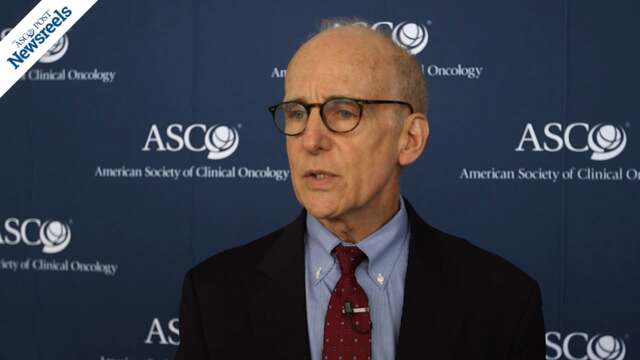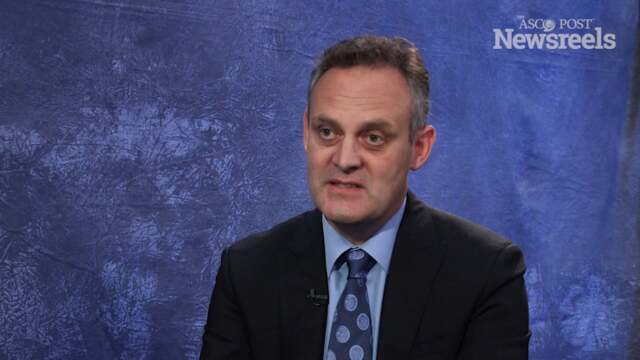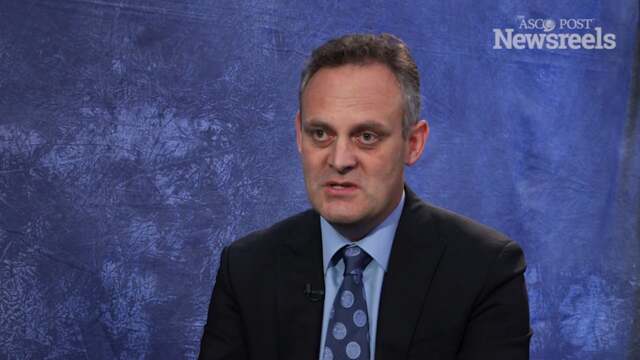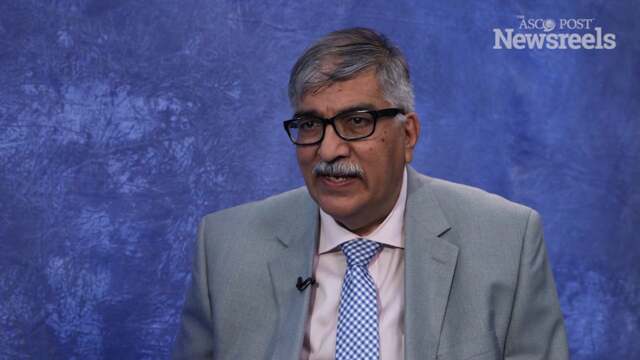2017 ASCO Annual Meeting
2019 ASCO: Sexual Harassment and Gender Disparities: Survey of Gynecologic Oncologists
A recent survey of U.S.-based physician members of the Society of Gynecologic Oncology found that 64% of respondents experienced sexual harassment in training or practice; among women, the rate was 71...
Adjuvant Pertuzumab in HER2-Positive Breast Cancer: Value Yet to Be Demonstrated
The ASCO Post issue of June 25, 2017, did an excellent job of summarizing the results and controversy generated by the initial results of the APHINITY trial, reported at the 2017 ASCO Annual Meeting a...
New Data Reported on Vemurafenib, Vitamin D, Selective Internal Radiotherapy, and Circulating Tumor DNA in Colorectal Cancer
RESULTS OF the IDEA trial, which showed that some patients with stage III low-risk colon cancer may require less oxaliplatin therapy (see the June 25 issue of The ASCO Post), were among the findings h...
Expert Point of View: Frank Sinicrope, MD
FRANK SINICROPE, MD, Professor of Oncology and Co-Leader of the GI Cancer Program at the Mayo Clinic, Rochester, said CHARTA addressed whether patient outcomes can be improved with a triplet regimen ...
More Support for FOLFOXIRI/Bevacizumab in Advanced Colorectal Cancer
A RANDOMIZED head-to-head comparison in patients with advanced colorectal cancer found that a regimen of FOLFOXIRI (fluorouracil/leucovorin, oxaliplatin, irinotecan) plus bevacizumab (Avastin) was mo...
In Case You Missed It: Short Takes on Current Cancer Research
MOST ONCOLOGISTS are familiar with the findings of the plenary sessions featured at the 2017 ASCO Annual Meeting, with topics ranging from the duration of adjuvant oxaliplatin-based therapy in stage I...
Are Wearable Physical Activity Monitors Coming of Age in Oncology?
COMMERCIALLY AVAILABLE wearable physical activity monitors have been making their way into clinical research in recent years; however, most studies on these devices have been related to non-cancer co...
Expert Point of View: Anne Tsao, MD, and John Heymach, MD, PhD
STUDY DISCUSSANT Anne Tsao, MD, Director of the Mesothelioma Program at The University of Texas MD Anderson Cancer Center in Houston, indicated the response rates seen in the MAPS-2 trial are compara...
Checkpoint Inhibitors May Prove to Be Effective in Mesothelioma
CHECKPOINT INHIBITION was effective against malignant pleural mesothelioma in the MAPS-2 study of the French Cooperative Thoracic Intergroup. At the 2017 ASCO Annual Meeting, researchers reported a d...
Expert Point of View: Ritu Salani, MD, MBA
STUDY DISCUSSANT Ritu Salani, MD, MBA, of The Ohio State University Wexner Medical Center, Columbus, agreed with the LION trial investigators. “Omitting systemic lymph node dissection in patients wh...
Study Supports Omission of Lymphadenectomy in Node-Negative Advanced Ovarian Cancer
SYSTEMATIC LYMPHADENECTOMY in patients with advanced ovarian cancer and complete resection offered no improvement in progression-free or overall survival in the Gynecologic Cancer Intergroup’s LION t...
Expert Point of View: Siwen Hu-Lieskovan, MD
“COMBINATION STRATEGIES are being developed, but the big question is what and how to combine,” said formal discussant Siwen Hu-Lieskovan, MD, of the University of California Los Angeles. “Anti–progra...
Combination Strategies for Jump-Starting the Immune Response
CHECKPOINT INHIBITORS have dramatically changed the landscape of the treatment of melanoma, lung, bladder, and other cancers. Researchers are focusing on exploring ways to extend the use of checkpoint...
Expert Point of View: Steven J. Cohen, MD, and Josep Tabarnero, MD, PhD
STEVEN J. COHEN, MD, Director of the Rosenfeld Cancer Center at Jefferson Health/Abington Hospital, Abington, Pennsylvania, and Vice Chair of Medical Oncology at Sidney Kimmel Cancer Center at Jeffe...
Tumor ‘Sidedness’ in Colon Cancer: Studies Look for Explanations
TUMOR “SIDEDNESS” in colon cancer has become a topic of great interest, after right-sided tumors were shown to have a worse prognosis than left-sided ones and biologics were found to differ in effica...
Expert Point of View: Joshua Jones, MD
ASCO EXPERT Joshua Jones, MD, Assistant Professor of Radiation Oncology at the Hospital of the University of Pennsylvania, Philadelphia, commented on the study at a press briefing. “This is a case w...
Drug Combinations Prove Effective Against Melanoma Brain Metastases
STUDIES PRESENTED at the 2017 ASCO Annual Meeting have shown that for melanoma that metastasizes to the brain, the combined use of checkpoint inhibitors and targeted agents can be effective. In COMBI...
Expert Point of View: Leisha A. Emens, MD, PhD
STUDY DISCUSSANT Leisha A. Emens, MD, PhD, of Bloomberg~Kimmel Institute for Cancer Immunotherapy at Johns Hopkins University, Baltimore, entitled her remarks, “Target Practice in Triple-Negative Bre...
Potent PARP Inhibitor Moves Ahead in BRCA-Mutated Breast Cancer
TALAZOPARIB, a novel inhibitor of poly (ADP-ribose) polymerase (PARP), showed encouraging efficacy in breast cancer patients with BRCA1/2 mutations in the phase II ABRAZO trial, presented at the 2017...
Retreatment With Checkpoint Inhibitors May Be Feasible for Some Patients With NSCLC
INCREASING NUMBERS of patients are being treated with checkpoint inhibitors, and about one-quarter to one-third will develop immune-related adverse events. One question on the minds of oncologists is...
Expert Point of View: John Heymach, MD
"TO PUT THESE RESULTS into context, currently we have three approved epidermal growth factor receptor (EGFR) tyrosine kinase inhibitors for EGFR-positive non–small cell lung cancer (NSCLC): gefitinib...
Dacomitinib Outperforms Gefitinib in EGFR-Positive NSCLC
DACOMITINIB, a second-generation epidermal growth factor receptor (EGFR)-targeted tyrosine kinase inhibitor, outperformed gefitinib (Iressa) as first-line treatment for EGFR-positive advanced non–sma...
Expert Point of View: Hans Hammers, MD, PhD
THE COMBINATION of checkpoint inhibitors and vascular endothelial growth factor (VEGF) inhibitors is attractive in renal cell carcinoma, said formal discussant of this trial, Hans Hammers, MD, PhD, o...
Atezolizumab/Bevacizumab Moves Forward in Metastatic Renal Cell Carcinoma
THE COMBINATION of atezolizumab (Tecentriq) plus bevacizumab (Avastin) showed promising results as first-line treatment of patients with metastatic renal cell carcinoma, according to a phase II trial...
Expert Point of View: Nitin Jain, MD, and Susan O'Brien, MD
Formal discussant of the GENUINE trial, Nitin Jain, MD, of The University of Texas MD Anderson Cancer Center, Houston, noted that the majority of responses to ibrutinib (Imbruvica) in high-risk patie...
Ublituximab/Ibrutinib Beneficial in Patients With Chronic Lymphocytic Leukemia
The addition of ublituximab (a glycoengineered anti-CD20 antibody) to ibrutinib (Imbruvica) improved response rates, depth of response, and led to quicker resolution of ibrutinib-associated lymphocyt...
Expert Point of View: Michael S. Sabel, MD; Marcela Maus, MD, PhD; and Carl June, MD
"We are now seeing the merger of immunotherapy with precision medicine. This is the epitome of personalized medicine,” said ASCO-invited expert Michael S. Sabel, MD, Chief of the Division of Surgica...
CAR T-Cell Therapy in Multiple Myeloma Yields 100% Response Rate
Chinese investigators reported that 100% of patients with relapsed or refractory multiple myeloma responded to autologous chimeric antigen receptor (CAR) T-cell therapy, and 14 of 19 (74%) who were ...
Expert Point of View: Leisha A. Emens, MD, PhD
Leisha A. Emens, MD, PhD, of the Bloomberg~Kimmel Institute for Cancer Immunotherapy at Johns Hopkins University, commented on the promise of anti–programmed cell death protein 1/programmed cell deat...
Pembrolizumab Moving Forward in Triple-Negative Breast Cancer
In the treatment of triple-negative breast cancer, checkpoint inhibition is making inroads in both early- and late-stage disease, and the line of treatment and expression of the programmed cell death...
Positive Results for APHINITY, but Value of Benefit of Dual HER2 Blockade Questioned
The results of the long-awaited APHINITY trial are in, and although the phase III study met its primary endpoint, it failed to establish dual HER2 blockade as the optimal adjuvant treatment for early ...
Pregnancy After Breast Cancer
Findings from a retrospective study showed that women who became pregnant after an early breast cancer diagnosis, including those with estrogen receptor–positive tumors, did not have a higher chance o...
Alectinib vs Crizotinib in First-Line Treatment of ALK-Positive NSCLC
In 2011, crizotinib (Xalkori) became the first effective targeted therapy for anaplastic lymphoma kinase (ALK)-positive non–small cell lung cancer (NSCLC). Now data from a phase III trial show that al...
SWOG Clinical Trials Have Yielded Positive Return on Investment
The National Cancer Institute (NCI)-funded SWOG clinical trials program has added 3.34 million years of life for patients with cancer in the United States because of successful therapies that were va...
Novel Tropomyosin Receptor Kinase Inhibitor Yields High Response Rates Across Tumor Types
Larotrectinib, an oral inhibitor of tropomyosin receptor kinase, showed “striking” activity in adult and pediatric patients with the genetic aberrations known as tropomyosin receptor kinase (TRK) fusi...
Abemaciclib Plus Fulvestrant Delays Breast Cancer Progression in MONARCH 2
In the treatment of metastatic estrogen receptor–positive breast cancer, a highly significant 45% reduction in progression was achieved with abemaciclib, combined with fulvestrant (Faslodex), in the g...
Olaparib Improves Progression-Free Survival in BRCA-Associated Breast Cancer
The PARP INHIBITOR olaparib (Lynparza) improved progression-free survival in women with HER2-negative metastatic breast cancer that was either hormone receptor–positive or triple-negative in patients ...
Two Studies Show Abiraterone Plus Prednisolone/Prednisone Added to Standard Hormone Therapy Improves Survival in Advanced Prostate Cancer
The addition of abiraterone acetate (Zytiga) plus prednisolone/prednisone to standard androgen-deprivation therapy improves survival in men starting treatment for locally advanced or metastatic, hormo...
Online Self-Reporting of Symptoms Improves Quality of Life, Extends Survival
When patients with metastatic cancer used a Web-based tool to self-report symptoms proactively during treatment, they lived 5 months longer than did patients assigned to usual care. In addition, they ...
Some Patients With Stage III Low-Risk Colon Cancer May Require Less Oxaliplatin Therapy
Patients with stage III colon cancer considered at low risk for recurrence may be treated effectively—and incur less neurotoxicity—with 3 months of an oxaliplatin-based regimen as compared with the st...
Expert Point of View: Richard L. Schilsky, MD, and Don Dizon, MD
“[THE STREAM, Conquer Fear, and CALM] studies focus on the psychosocial aspects of coping with cancer. One theme that binds them is that oncologists take pride in the fact that we treat people with ...
Brief Psychological Interventions Positively Affect Cancer Patients’ Well-Being
Three separate brief psychological interventions aimed at helping cancer patients cope with distress have shown improvements in quality of life and well-being across the continuum of cancer care. The ...
ASCO 2017: SWOG Clinical Trials Have Added More Than 3 Million Years of Life for Patients With Cancer
For an investment of $125 for each year of life gained since the 1950s, the National Cancer Institute (NCI)-funded SWOG clinical trials program has added 3.34 million years of life for patients with c...
Greta Stifel on Neuroendocrine Tumors: A Patient's Message to Physicians
Greta Stifel recounts her story about a misdiagnosed tumor and urges physicians to raise awareness of neuroendocrine disease.
David H. Henry, MD, on Advances in Lung Cancer, Colorectal Cancer: Expert Perspective
David H. Henry, MD, of Pennsylvania Oncology Hematology Associates, outlines abstracts focusing on chemotherapy in locally advanced rectal cancer and immune-related toxicity, response to anti–PD-L1 bl...
Lisa A. Carey, MD, and Richard S. Finn, MD, on Breast Cancer: Findings From the PALOMA-1/TRIO 18 Trial
Lisa A. Carey, MD, of the University of North Carolina, and Richard S. Finn, MD, of UCLA Medical Center, discuss phase II overall survival findings on palbociclib in combination with letrozole vs letr...
Arnaud Scherpereel, MD, PhD, on Mesothelioma: Results From the IFCT-1501 MAPS2 Trial (French Language Version) 
Arnaud Scherpereel, MD, PhD, of the University Hospital of Lille, discusses in French phase II study findings on second- or third-line nivolumab vs nivolumab plus ipilimumab in malignant pleural mesot...
Arnaud Scherpereel, MD, PhD, on Mesothelioma: Results From the IFCT-1501 MAPS2 Trial
Arnaud Scherpereel, MD, PhD, of the University Hospital of Lille, discusses phase II study findings on second- or third-line nivolumab vs nivolumab plus ipilimumab in malignant pleural mesothelioma pa...
Rakesh Chopra, MD, on Global Health Care: Expert Perspective
Rakesh Chopra, MD, of India’s Artemis Hospitals, discusses ASCO’s Role in global cancer care and the issues he finds most pressing.






